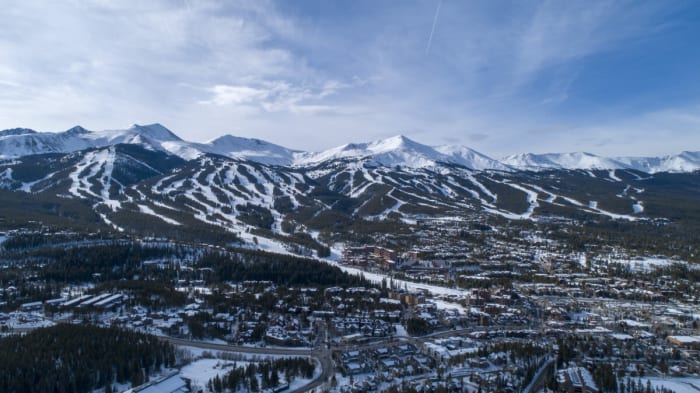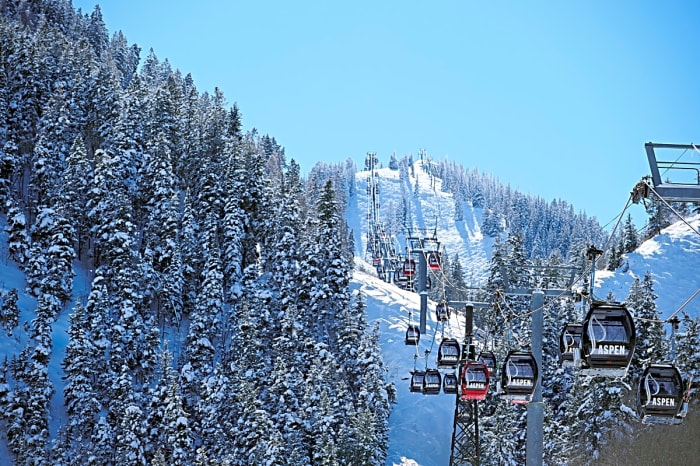Thanks to a handful of ski resorts known for opening earlier than most, Colorado often offers one of the longest winter operating seasons in the U.S.
Skiing is skiing, so visiting the state’s mountains any time between fall and late spring will, of course, deliver good times, but there are periods that are better than the rest if quality conditions and a wide selection of open terrain are what you’re after.
Here’s the breakdown of when to ski in Colorado.
Want to keep up with the best stories and photos in skiing? Subscribe to the new Powder To The People newsletter for weekly updates.
A Quick Rundown of Colorado's Ski Seasons
If you’re short on time, this is a quick overview of what each period has to offer to Colorado visitors:
- The Early Season (November and early December): Cheaper tickets make this option tempting for diehard skiers, but those who want to experience the entirety of the ski resort they’re visiting will likely be disappointed by the lack of available terrain. Beginner runs are harder to come by, too.
- Midwinter (Late December, January, February and March): This is when ski resorts hit their stride. By January, many lifts and terrain are usually open. Yet, to account for the arrival of increased demand, ski resort lodging and tickets become more expensive. The snow quality can vary week-by-week, but powder days arrive with the most regularity during midwinter.
- The Late Season (April, May and June): In April and May, the weather can become quite inconsistent, with significant temperature fluctuations. But when it’s warm—or during a surprise spring powder day—the late season is among the best times to hit Colorado’s slopes, thanks to lesser crowds and cheaper tickets.
Now, on to the details.

When Is the Best Time To Ski in Colorado?
Much like other ski states, the heart of winter—between December and March—typically delivers the best conditions and snow coverage in Colorado. During this period, ski resorts will be fully operational and have the largest number of lifts open. That translates to more available runs, and when you aren’t relegated to one or two groomed runs, skiing is more fun.
A word of caution, though. The tail end of December coincides with Christmas and the holidays when, for major ski destinations like Vail Mountain or Breckenridge, the slopes are crowded with vacationing tourists. To account for the droves of skiers, mountains typically raise their day ticket prices. Cheaper multi-pass options, like the Epic Local Pass and the Ikon Base Pass, have blackout dates at the end of December, too, restricting their use.
So, if you’re looking to avoid the crowds and don’t want to tangle with blackout dates or pricier day tickets, consider skiing in Colorado after December passes. January, February and March are all solid bets, with the crowdedness of the slopes declining as spring approaches.

The Best Time To Ski in Colorado for Peak Snow Coverage
As already noted, mid-winter is the safest bet when planning a Colorado ski vacation.
But every winter is different, and, some years, the mountains take a little longer than usual to build up a solid snow base. Skiers who have the flexibility to wait and scope the conditions (you can Google any ski resort’s “mountain report” or“snow report” to see what’s open) before pulling the trigger on a trip should do so.
The coverage could be fantastic by mid-December. It can also take until January before ski resorts have opened all of their terrain. In 2025, Arapahoe Basin had all of its lifts operating by January 12.
What’s the play, then? For longer-term trip planning, consider hedging your bets and plan to arrive in February. March can deliver epic powder, too.

What About Skiing in Colorado During November?
For diehard skiers, Colorado’s commitment to early-season action is a gift. Hot spots like Keystone, Loveland, and Arapahoe Basin regularly open before Thanksgiving, offering skiers an early taste of winter before the rest of the country can catch up. During this phase, tickets and lodging are cheaper, and the masses haven’t yet gotten into the skiing groove.
The affordability can come with a cost in the form of lesser terrain and poorer coverage (read: more rocks), though. That might also make the slopes feel busier than they are, as skiers crowd into the lines of the few lifts available. As a general rule that applies to any time of year, avoid skiing on the weekends to dodge the crowds if you can.
Spring Skiing in Colorado
When spring shows up in late March, most skiers stow their gear and move on to other, more seasonally appropriate activities like mountain biking or yard work. As you might expect, that’s a win for those who prefer to avoid lift lines. From March onward, the slopes get quieter and quieter, which can facilitate quick laps on your favorite runs.
And, as summer approaches, warm, springy days tend to become more common. In May, for example, skiing in a T-shirt isn’t out of the question.
But keep some warmer gear on hand. May can also deliver surprise spring powder days in Colorado when the stars align. Pair that with lesser spring crowds, and you’ve got the perfect recipe for a great time.
Throughout May, major Colorado ski resorts begin shutting down. One spot, Arapahoe Basin, keeps the action going as long as possible, though, regularly staying open into June.
If you're a competent skier who doesn’t mind slushy snow, our advice is this—put a late May or early June trip to Arapahoe Basin on the calendar. You’ll thank us later.
More must-reads:
- Pacers' Pascal Siakam posterized fellow sidekick during Game 6
- Wayne Gretzky criticizes Oilers after Stanley Cup loss
- The 'Most goals in a Stanley Cup Playoffs' quiz
Breaking News
Trending News
Customize Your Newsletter
 +
+
Get the latest news and rumors, customized to your favorite sports and teams. Emailed daily. Always free!








